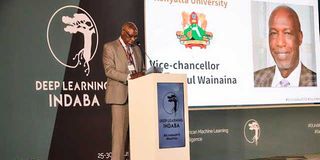Let us seek solutions to copyright challenges of artificial intelligence

Kenyatta University Vice-Chancellor, Prof Paul K. Wainaina, at the launch of 2019 Deep Learning Indaba conference at the institution. The annual meeting convenes the African machine-learning community.
In the past two months, there has been excitement and fury as the initial extent of the impact artificial intelligence (AI) is likely to have on humanity became clearer.
The technology has elicited fear of job losses at an unprecedented scale even in traditionally ‘safe’ sectors like architecture and law. But the biggest impact is likely to be felt in the creative field, where tasks that ordinarily took long and required specialised skills are being delivered in a much shorter time.
Then came the news that AI has been generating songs and high-grade art from existing works in a simulated machine-learning environment. That led to several class action suits in the US by visual artists and open-source software developers against leading AI technology firms ChatGPT and Stabilise.
An AI system can only create based on what has been fed into it through the process of machine learning. Based on the ‘knowledge’ distilled from machine learning, it can generate works ‘in the style’ it has learnt.
Machine learning involves billions of works being fed into the system and similar ones being produced by the technology. And that is the reason for the rights holders’ concern. It is reportedly able to access, copy, remix, regurgitate, adapt and produce a substantially similar style of work to the one whose ‘data’ was used to train during machine learning.
Social media is rife with works created by AI from musical compositions and visual art in the style of artistes who were never consulted about the use of their work. Artistes have now come out to express their concern and condemn the use of their work for machine learning. An Australian musician and songwriter have condemned the use of ChatGPT-created songs labelled ‘In style of Nick Cave’.
The artistes’ furore comes from the fact that their works have been accessed and used without authorisation for the purpose of machine learning. And given that the works generated are ‘in the style of’ potentially creates endless possibilities of works like theirs being reproduced and sold.
Vulnerability
This has come as a shock to artistes, who have never felt more vulnerable since the internet and digitisation brought along Napster. Now many are afraid that artistes might soon be redundant, and it raises the question as to the nature of those AI-generated works.
The promoters of machine learning technologies have defended themselves under the fair use or fair dealing cover.
While large-scale ingestion of data is not new in copyright, what makes AI an issue is the capability that it offers to users to initiate commands that result in the creation of derivative works like the ones it was trained on, and based on, the data generated and works stored within its system.
This is happening at a time when the world has not fully set the boundaries for the use of copyrighted works in the digital environment and this technology is moving at a tremendous pace.
Under Kenya’s copyright law, wide access, storage and the use of copyright work, including caches, is protected. It comes with a requirement for attribution and acknowledgement of authors and sources. With AI, reproduction is facilitated and no acknowledgement is made to works forming part of the generative algorithm.
Worse still, the generic versions, which are like the original in style and form, are not subject to copyright. This is because the basis of copyright protection is human creativity. As such, it can unfairly exclude works created by human authors from the market. The massive intake and storage of their works data within AI systems and the creation of derivative works based on them facilitated by the program, therefore, represent a real threat to rights holders.
Under the global copyright regime, works created by machines do not enjoy copyright protection. However, there have been appeals seeking registration of copyright to works generated by AI in several countries. So far, none of them has succeeded and there is no sign that any country will allow it soon.
Kenya will watch and learn from those countries as the issue will be home sooner rather than later.
Mr Sigei is the executive director, Kenya Copyright Board. [email protected].




